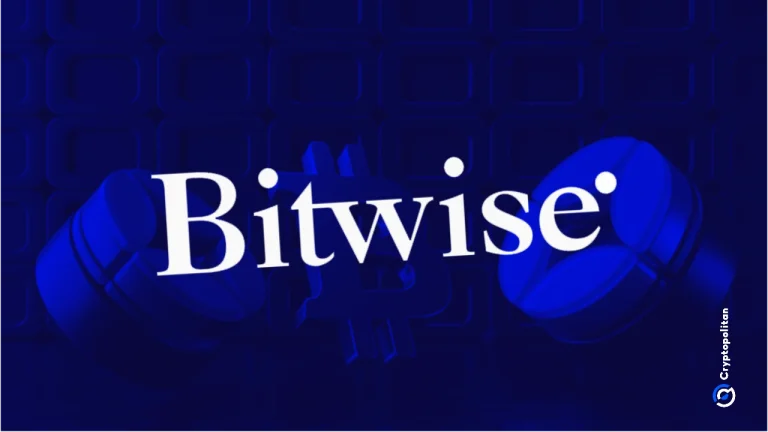Quick Summary
- Bitwise Asset Management is launching the Bitwise Solana Staking ETF (BSOL), offering direct exposure to spot Solana (SOL).
- The ETF will trade Solana tokens on-chain to generate yield, with an anticipated ~7% annual return from staking rewards.
- BSOL is designed to simplify Solana investment for both institutional and retail investors by managing custody and staking complexities.
- The launch coincides with a surge in crypto ETFs entering the U.S. market, facilitated by recent SEC guidance on registration statements.
- This move by Bitwise could signal a broader trend of single-asset crypto ETF launches, mirroring the impact of Bitcoin and Ethereum ETFs.
Bitwise Re-enters Crypto ETF Market with Solana Staking ETF
Bitwise Asset Management is making a strategic return to the cryptocurrency ETF arena with the introduction of the Bitwise Solana Staking ETF (BSOL). This new offering is notable for being the first exchange-traded product in the United States to provide entirely direct exposure to spot Solana (SOL).
The BSOL ETF is scheduled to commence trading on the New York Stock Exchange (NYSE) this Tuesday. This launch represents a significant achievement for Solana, currently the sixth-largest cryptocurrency by market capitalization. Bitwise officially announced the ETF’s debut on X (formerly Twitter) on Monday, characterizing it as a pivotal moment in integrating Solana into mainstream investment strategies.
Solana Staking Yields and Management
The Bitwise Solana Staking ETF will not only hold Solana tokens directly but will also actively stake them on the blockchain to generate additional yield from network rewards. Bitwise projects that these staking returns could approximate 7% annually. These rewards will be automatically reinvested back into the fund, aiming to enhance overall performance.
⚡ To ensure reliability and adhere to regulatory requirements, the on-chain staking operations for BSOL will be managed by Helius Technologies, Bitwise’s chosen infrastructure partner. The ETF features a management fee of 0.20%. However, Bitwise has announced a temporary fee waiver for the initial three months or until the fund reaches $1 billion in assets under management, whichever milestone occurs first.
Industry analysts suggest that BSOL’s competitive fee structure, combined with its integrated staking feature, is likely to attract both institutional investors and individual traders. These investors may be seeking exposure to the Solana ecosystem without the inherent complexities of self-custody or the difficulties associated with direct on-chain staking.
U.S. Market Dynamics Amplify Crypto ETP Wave
The introduction of the Bitwise Solana Staking ETF arrives amidst a burgeoning wave of cryptocurrency-focused ETFs entering the U.S. market. Reports indicate that Canary is also preparing to list its Litecoin (LTC) and Hedera (HBAR) ETFs on Nasdaq on the same Tuesday the BSOL ETF debuts. Furthermore, sources suggest the Grayscale Solana Trust ETF is slated for launch later in the week.
These launches occur during a period of U.S. government shutdown, which, while impacting overall operations, has left the Securities and Exchange Commission (SEC) functioning with a reduced staff. Typically, SEC staff are responsible for vetting and approving ETF filings; however, under the shutdown protocols, many such processes are temporarily put on hold.
Despite these limitations, companies have found innovative legal pathways to advance their ETF offerings. Recent guidance from the SEC earlier this month allows asset managers to file S-1 registration statements without requiring a delaying amendment, with registrations automatically becoming effective 20 days later. This procedural adjustment has enabled crypto ETF issuers, including Bitwise and Canary Capital, to proceed with their listings even while the SEC operates at a reduced capacity.
Prior to the shutdown, the SEC had already approved new listing standards for commodity-based trust shares across three major exchanges, a decision that effectively cleared the path for the introduction of these crypto ETFs.
Investors Position for Solana’s Next Growth Phase
The Bitwise Solana Staking ETF is positioned not merely as another investment vehicle but as a crucial conduit linking decentralized finance with traditional Wall Street. By embedding the staking mechanism within a regulated ETF structure, Bitwise is effectively merging passive income generation capabilities with institutional-grade accessibility.
This innovative approach enables investors to engage with Solana’s growth potential and its yield opportunities without navigating the complexities of managing private keys or directly interacting with on-chain staking protocols. It also serves to lower barriers for large institutions, which often face significant compliance hurdles, in their ability to hold or stake cryptocurrencies directly.
Solana has witnessed substantial growth, with its value increasing by over 40% in the past month. This appreciation is attributed to heightened on-chain activity, a continually expanding developer ecosystem, and increasing institutional interest. Analysts believe that the launch of BSOL further solidifies Solana’s position as a leading blockchain network, especially as the adoption of ETFs gains momentum.
Industry experts suggest that Bitwise’s strategic move could serve as a catalyst for a broader trend of single-asset cryptocurrency ETF launches. This development mirrors the significant impact that Bitcoin and Ethereum ETFs had on the digital asset investment landscape earlier in 2021.
As the cryptocurrency ETF sector continues its expansion, competition among issuers is expected to intensify. Key differentiators, such as cost-effectiveness, yield-generating capabilities through staking, and robust liquidity, will likely play crucial roles in capturing investor attention and market share.
Expert Summary
Bitwise Asset Management has launched the Bitwise Solana Staking ETF (BSOL), offering direct SOL exposure and on-chain staking for yield. This move simplifies Solana investment for institutional and retail investors, navigating regulatory processes during a U.S. shutdown. The launch could pave the way for more single-asset crypto ETFs.

